I asked my dad if he would be willing to baptize me, and he was honored to do it. We got into the baptistery at the front of the church (behind the pulpit) from opposite sides. There were little rooms on either side of the baptistery where people could get dressed to prepare for getting all wet. The baptizer wore hip-boots or waders. The baptizee took off their regular clothes and put on a white robe, since they were going to get soaked.
He asked me if I believed that Jesus Christ was the Son of God. I did. I think I recall his voice being a little shaky with emotion as he said the traditional words over me: “Upon the confession of your faith, I now baptize you in the name of the Father, and of the Son, and of the Holy Spirit, for the remission of your sins.” He reminded me to pinch my nose closed, and then dunked me backwards under the water.
Afterwards, Charlie Lane the night watchman walked with me on the sidewalk behind the church to our house across the street corner. He said, “You try to be really good now, and make it easier on your father.” It didn’t occur to me until I wrote this that Daddy must have invited my beloved Charlie to witness my baptism. Why on earth would he be there, at that time of the morning on a Sunday? He was the night watchman. Perhaps Daddy was trying to use the event as a silent witnessing opportunity. He was always concerned when someone wasn’t “a member of the Church” although I suspect Charlie had some personal faith stemming from his youth in the Church of England.
Something huge occurred in my musical world about this time. Barbra Streisand had recorded several albums in 1963, but the first album I fell in love with was Barbra Streisand/The Third Album. She’s photographed in the dark with just a spotlight, sitting on a stool in some club. I loved every song, memorized every word, and introduced this Queen of Romance to Sara as well. We would lie on the floor of the study at her house, in the dark with our heads between the stereo speakers, and sing our little pre-teen hearts out. The next album we loved was released in 1964, People, with Barbra standing on an ocean shore.
Then in 1965 Barbra did a TV special called My Name is Barbra that thrilled my heart. It was so playful, so delightful, so exciting to see somebody be that creative and that freely expressive. I had a lot of favorite songs from her albums, but one that still sounds fresh and unique to me today will give you a sense of the tenderness she was helping me to express. This one was from The Third Album. I was already learning things about songwriting, because I loved how the melody line seemed to describe circles to fit the circle the lyrics talked about.
one curving line, simple and fine.
Now add two eyes and a lopsided nose,
and, if you care, add some hair.
Now draw two eyes, and make them bright
because they’ve just seen a beautiful sight.
Sketch in a mouth with a radiant grin,
one coming deep from within.
You’ve drawn me a circle, and
now that you’re through,
it’s a picture of me…
after being with you.”
But the other seventh grade teachers! My goodness, they were just awful. We had a man who sold produce for a living, Mr. Rayport, who would come in to teach us social studies. He and I had an altercation because on a True and False test, I said the serfs did NOT enjoy Christmas, and he marked it wrong because he said they DID. Or was it the other way around? I can still recite the case that was made for both points of view, so I’m not sure which one I held at the time.
We had a tall, black-haired lady teacher, Mrs. Wright, for English and History who we thought didn’t know as much as we did. Unfortunately, she had big lips and we couldn’t help noticing that, in a mean, mocking sort of way. Mrs. Wright made me cry in frustration because she gave me a B+ on what I thought was a truly excellent map I had drawn. She claimed that the map was wrong because I had the Pony Express starting in St. Louis, instead of the suburb of St. Louis where it actually began. (Was it St. Joseph, Missouri?)
The man who taught us math and science, Mr. Palmer, was really truly mean, and seemed to enjoy embarrassing one or another of us in front of the class. When you are in seventh grade it is an especially bad age to be embarrassed in front of any group. (Of course, really nobody ever likes that at any age.) I fell down in the back of the classroom once, and he came all the way back there from the front, pretending to check the floor to see if I had damaged it in the fall. This was pretty humiliating for me.
Mr. Palmer taught us the “new math” and it became quickly evident to Marilyn and me that Mr. Palmer did not understand what he was teaching. What an unfortunate bunch of adults, trying to teach kids who arrogantly felt that they were smarter than their teachers. We didn’t trust or respect our elders much at all by the time we had reached the age of eleven and twelve.
We had Mrs. Mac for English the first part of the year, but Mrs. Wright took over the class because Mrs. Mac got sick, and finally died that year. Her death was the first one any of us had experienced up close, and her funeral was the first funeral we had attended. The whole school went, and there were a kazillion flowers. I didn’t like the smell of carnations for years after that. It was very sad because we knew we would miss Mrs. Mac, but we also knew that the Lord would take good care of her so it wasn’t so terrible to worry about her.
Seventh grade was the year I became aware of boys for real. There was a brief flirtation in sixth grade with a boy named Raymond Pate, but both of us were so shy that we actually never had a conversation. The entire relationship was negotiated and reported on by other people. In fact, I think it was entirely invented by my classmates, unless he actually did notice me all by himself. I’ll never know the answer to that, I suppose. The back and forth messages and even the brief “going steady” kept my classmates entertained for some time…and all without a word directly spoken between the principal parties!
0 ~ o ~ 0 ~ o ~ 0
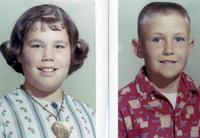 None of these items was the reason I was stunned to see these documents for the first time in thirty years. With the sixth grade stuff was a little group of the notes to which I referred above, from Raymond Pate. For lo these many years, I had remembered that episode with him as something impersonal, arms length, and, as I wrote, even “invented” by my classmates.” What a shock to read his notes. “I love you, Gwen Moore.” “I dreamed about you and me last night. We were married, we had ten kids, the kids were playing and we were watching TV.” He even drew something that looked like an anagram, linking our names together where the letters matched. He made little packets out of notebook paper and staples to send me the notes in. He asked if he could call one night. He gave me his address and phone number. He was as serious as a sixth grader ought to get.
None of these items was the reason I was stunned to see these documents for the first time in thirty years. With the sixth grade stuff was a little group of the notes to which I referred above, from Raymond Pate. For lo these many years, I had remembered that episode with him as something impersonal, arms length, and, as I wrote, even “invented” by my classmates.” What a shock to read his notes. “I love you, Gwen Moore.” “I dreamed about you and me last night. We were married, we had ten kids, the kids were playing and we were watching TV.” He even drew something that looked like an anagram, linking our names together where the letters matched. He made little packets out of notebook paper and staples to send me the notes in. He asked if he could call one night. He gave me his address and phone number. He was as serious as a sixth grader ought to get.I’ve remembered the Raymond Pate period as insignificant, but in truth it appears to me now that I rejected him. I must have been afraid. There’s also a note from me to Marilyn, asking if I ought to write him, and her response, suggesting I show her what I would write before giving it to him. Seeing those notes last night made me feel a little taste of what I felt when I read my parents’ love letters years ago. I have a box of letters that my dad wrote to my mom both before and after they married, while he was doing his equivalent service as a Conscientious Objector at Camp Forrest in Tullahoma, Tennessee.
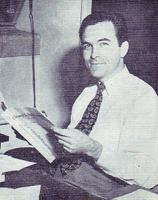
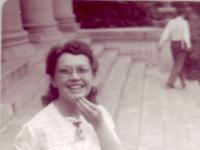 Grandmommie, Momma’s mother, gave me the box of letters as I was leaving Nashville to go to school in Connecticut in 1975. When I got settled in my new dorm room, I read them and wept. In the letters, it’s so clear that he was plighting his troth to her, wooing her, and she wasn’t buying. One quote goes something like, “I wish I could believe all your beautiful words, but I just can’t.” I was stunned at the depth of my mother’s rejection of herself and therefore of his declarations of love. And at that point in my life, I was afraid that I was destined for the same unavoidable situation. I really do thank God that this was not my ultimate state. Here's a picture of Momma and Daddy when they were writing some of those letters, in 1942.
Grandmommie, Momma’s mother, gave me the box of letters as I was leaving Nashville to go to school in Connecticut in 1975. When I got settled in my new dorm room, I read them and wept. In the letters, it’s so clear that he was plighting his troth to her, wooing her, and she wasn’t buying. One quote goes something like, “I wish I could believe all your beautiful words, but I just can’t.” I was stunned at the depth of my mother’s rejection of herself and therefore of his declarations of love. And at that point in my life, I was afraid that I was destined for the same unavoidable situation. I really do thank God that this was not my ultimate state. Here's a picture of Momma and Daddy when they were writing some of those letters, in 1942.So there were these archetypal boys in our class and I started to appreciate their various qualities. Timmy Robertson was a tall, thin, All-American type who did a paper that year on kinesiology and wowed us all with the big words. He always wore plaid Pendletons, which were a popular light wool jacket worn by the cool guys of the day. His friend Jesse was as short as he was tall, but what made Jesse cool was his very long, sun-bleached hair and the fact that he was a serious surfer.
With Donnie Humphreys I had already developed a music connection over the Beatles the previous year, and he was the class clown and by far the most energetic and lively of the boys. His antithesis also got my admiration. James Cagle was quiet, droll of humor, more mature in his demeanor than any of the other guys, and he was into current events. He was the first person my age to value knowing what was going on in the bigger world around him, and he inspired me to pay more attention.
Something important happened to Marilyn in seventh grade. She met a person who was going to become very significant in her life. Janice Hahn was the daughter of an old Pepperdine graduate named Kenneth Hahn. Kenny had been elected as a member of the Board of Supervisors of the County of Los Angeles, and he served there for forty years. Janice came from a Lutheran private school to Lockhaven in seventh grade and she and Marilyn got to be friends. From then on, when we had a get-together, Janice was often there. Besides school, all of us went to Camp Tanda in the Big Bear Mountains two different summers (for a week) and stayed in a cabin together. We went to different churches, though. Janice and her older brother Jimmy, and their parents, Kenneth and Ramona, went to the Inglewood Church of Christ.
Janice and Marilyn were both very strong willed, both smart and funny, both had powerful fathers, both knew what it was like to always be in the public view. I think it was very important to them to have a friend who understood all that. God blessed them with a special friendship which lasted for the rest of Marilyn’s life.
A nice thing happened for me in Janice’s arrival. I was no longer the only Democrat I knew. My dad was what they called a “Southern Democrat” which was not exactly the same thing, but everyone else we knew were Republicans, some of them John Birch Society types at that. Janice and I were now the two Democrats at Lockhaven Christian School, and although I didn’t really feel any support from her, I didn’t feel quite so much a pariah anymore.
One cool thing about knowing the Hahns was that Kenny would get us tickets to a special Christmas program every year. (At the time, I would have said that it was “neat” to get to go.) There is a huge, beautiful building in downtown Los Angeles that was called the Dorothy Chandler Pavilion at the Music Center. (There was also the Mark Taper Forum, a smaller theater where we saw some plays.) It was all pretty and new back then. On Christmas Eve day, choirs and singers and musicians from all over the city would come there to perform. Kenny let us sit in a special section of the auditorium called the Founders Circle. I really liked having that as part of our Christmas. Finally, our family had a tradition!
I really felt that I owned L.A. Part of that feeling was the result, I guess, of our parents having met the rich and famous, mostly trying to get them to give to Pepperdine. The Youngs and my parents talked about city leaders and notable people as if they were associates. When I went with my college boyfriend for the first time to the Music Center, we walked up to the marble wall where all the donors for the Dorothy Chandler Pavilion were listed, and I started reading them off, saying, “We know him, and we know them, and we know them…” I wasn’t showing off, or promoting myself as having some kind of special status, although that may sound impossibly disingenuous. I was actually trying to reassure him, “See, you can relax now. You’re with someone who belongs here.”
At some point in college, I got an update on some of my Lockhaven classmates. Who was reporting on them, I can’t imagine, but I wrote it down and saved it. It’s such a microcosmic snapshot of my generation in L.A. in the ‘Sixties. I wish I had added myself to the list so we could see how I would have described myself at that moment.
“Jesse: Working, stable, already middle class.
Cheryl: Married to an older, financially successful career soldier
Timmy: Student Body President at North High, studying at Biola for the Baptist youth ministry. (Now that was predictable.)
James: Unwed father, acid and meth freak, shooting up. (Too much pain with no resources to cope.)
Donnie: Promiscuous frustrated actor, rich freak
Marilyn: Ex-bad girl (one year of actual trauma with psychological help), now involved with an Okie football player (receiving desperately needed strokes from non-acceptable partner.) (Current update: Became a much beloved therapist, very happily married for nine years, two children; died in 2001 of leukemia.)
Janice: P.E. major, no satisfying male/female relationships, doing poorly in school.” (Current update: Elected Councilwoman for the City of Los Angeles.)
All of our parents were busy people. My parents and Norvel all worked full-time for Pepperdine. Helping Norvel, putting on multitudinous Pepperdine events, editing the two magazines, caring for the children and the upkeep of the household kept Helen constantly running. (Until her devastating tumble in 2003 when we almost lost her, she still ran everywhere, in her high heels with her painful metatarsal arches.) We didn’t have much supervision, to say the least.
During the years when Marilyn and Sara and I were little girls, I spent the night at their house pretty often. They had an extra bed in their room, so the three of us would each have our own twin bed. Sometimes we would have slumber parties, and we would invite Susan Teague and Beth Ross, and later on, kids from school like Janice Hahn, and we would try to stay up really late. But as hard as we tried, we never could succeed in staying up all night until dawn. We watched some really bad B movies on TV while making the effort, though.
It seemed that everyone in my life thought it was funny to scare me. My friends, my cousins, Nannie (my dad’s mother) all enjoyed telling me scary things, and even when I begged them to, they wouldn’t stop. One night when we were pretty young, Sara and Marilyn and another girl and I were all lined up on the floor of Marilyn’s side of the room having a slumber party. Just beyond her room was one of the two large attics upstairs, and for some reason one of the girls decided to scare me about what might be lurking in the attic. It was crazy, because we had played there so much. But still I began to get terrified. I ran into Emily’s room and begged her to defend me. I don’t know if she didn’t take my crisis seriously or if she didn’t know what to do to help, but she did not take action.
That hurt, because I really looked up to her. Emily was my ideal of a teenage girl. She was eight years older than us, she could drive, she rolled and ratted and sprayed her hair, she wore hose and she read teen magazines. Once there was a movie projector and a big screen in the Youngs’ living room, I don’t know why, and we girls all watched April Love together. Emily loved Pat Boone.
We all did. He was the only Church of Christ glamour king, because he had made it big in Hollywood as an actor, and as a singer on the radio. He got his start winning the Ted Mack Amateur Hour, and went on to make lots of records. He even wrote books for teenagers, because the adults thought he could be a good role model. We all read his books, ‘Twixt Twelve and Twenty and Between You, Me & the Gatepost.
While Emily was still in high school, she was taken to the hospital because she couldn’t move. I had never heard of paralysis before. I went with Sara and Marilyn and Helen to see her and there she was, lying a hospital bed. It was my first time to be in a hospital, and it scared me. I could feel the fear in the halls, and I hated the smell. I wanted so badly for Emily to be okay, and I didn’t know if she would ever come back home from there.
One year it was New Year’s Eve and a bunch of us were having a slumber party in the guest rooms. We knew that people are supposed to make a lot of noise to celebrate when the clock turns to midnight, so we went to the kitchen and got out all the pots and pans. We were in our nightgowns, because in California back then it was warm enough to do that most of the time, even at night on December 31. We all ran out onto the grass of the Pepperdine campus banging our pots and pans. There was the night watchman, Charlie Lane, an Englishman with a soft heart, who heard us and came running after us. The noise must have given him a fit until he discovered who was making it. He herded us safely back into the house, and then warned us that we had better not do that again!
We tried once to have a slumber party at my house. We were all going to sleep in the living room, and unfortunately there was no door between it and the hallway, and my parents could hear us making a racket down the hall in their bedroom. My dad got out of bed more than once and stood in the doorway in his pajamas with a glowering look on his face. The next day, he informed me that there would be no more slumber parties at our house. Hosting those would be the Youngs’ exclusive privilege.
Marilyn was already practicing being a good mother when she was young. She was very nurturing and also somewhat critical, and she was quite concerned about me biting my nails. She was so proud of me the year I quit and let them grow longer. Marilyn liked to say that she was a recovering perfectionist. A perfectionist can see how something ought to be, or how it ought to be done, and then give up even before they even start because it seems overwhelming or impossible. I can be like that sometimes. It was that way with Marilyn and cleaning her room.
When Emily married Steven Lemley and moved away, Marilyn moved across the hall from Sara and had her own room. It was always very full of stuff. She would have things covering her bed, so that there was only a little piece of the bed on the edge where she could sleep. And she slept very hard – it was really tough to wake her up sometimes, she slept so deep. Anyhow, I remember laughing when she packed up and moved away to college. I told the maid, Geraldine, “You know, I honestly never knew Marilyn’s carpet was green.” It had always been completely covered up with stuff!
We watched a lot of TV when I was at the Youngs’ house on the weekends. (They had a limit on school nights.) Each year we would sit in the king-sized bed and pontificate on the Miss America pageant candidates. “She’s not so cute! Look at those thighs! What about that swimsuit! Look at that nose! ” There were certain shows that so mesmerized Sara that she literally could not hear her mother calling her. I would say, “Sara, your mother wants you.” She would not respond, not even a blink. I would get closer and say it directly into her ear, and she still wouldn’t budge. It was like she was in a trance.
Over the years we made many trips to visit the relatives, usually in the summer or at Christmas. Below is a 1962 photograph of me with my cousins Pam, David and Wayne. We had found a nest of bunnies under the roots of a tree in their yard on Harding Place. Their parents were my mother’s brother V.M. (Virgil Marion Whitesell, after his dad) and his wife Lois (Church). David and Wayne were adopted, and they also adopted two more children, a brother and sister, Barbara and John. V.M. was a salesman for the same company where my uncle Paul was a graphic artist, Williams Printing Company.
I was spending time with my cousins in Nashville when the Watts riots broke out in the summer of 1965. Watts was the neighborhood next to Pepperdine. Marilyn was staying with Steven and Emily in another suburb of L.A. while her parents were away on some trip, like as not to China, or maybe to visit with the Shah of Iran. Norvel and he were buddies for awhile, and the Shah was considering some kind of deal with Pepperdine. We certainly had a lot of Iranian students in the following years.
When she heard about the riots, Marilyn insisted she was going home to the Budlong house. Since the Pepperdine campus was not far from the place the riots were happening, she and Steve fought about it, but she would not give in to him. She went home. I was stuck in Nashville hearing about the riots and the fires and the looting on the TV news, and feeling very cut off from my home. My uncle V.M. would not allow me to call to make sure everybody was okay. That was so hard.
Here is Chip, our cousins Suzanne and Ronny Moore, and in the front row, Bonnie Kay Moore and me. We were all double cousins, because my mother’s younger sister Marian Marie married my dad’s younger brother Paul Webb. Paul and Marian actually fell in love and got married before my folks decided to hook up. The story goes that a bunch of young college folks did things together in a “crowd” for years, and as they began to pair off, finally my mom and dad were the only two still single. They looked at each other and said, “Why not?”
There was a third set of aunts and uncles. My dad had a another brother, the youngest of the three, named Winston Martin Moore. He found a sweetheart named Martha Nell in Memphis and wooed and won her. When they were a young married couple without children, Winston would take all the cousins out to the movies from time to time, and he therefore became Chip’s favorite uncle. Chip decided to carry on that tradition with Sharyn’s cousins’ children and continues it to this day, although most of the cousins are fully capable of paying their own way. 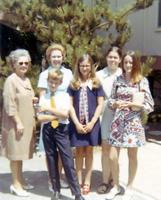
Here are Momma, Martha Nell and Larry, Carol Ann, me and Beth Mingle, a family friend, around 1970.
Winston was an officer for Third National Bank, which is no more. After he retired from banking, he became the business manager and co-owner of 20th Century Christian corporation. Martha Nell and Winston adopted two children, Carol Ann and Larry. I loved to visit their house when we were little because there was an enormous playroom and we children had the run of the house. Marian’s house was like my own, naturally enough since she was my mother’s sister, with lots of rules and particularities, but Martha Nell seemed to run a looser ship. She did warn Carol Ann in my presence once that if she didn’t watch it she would gain weight like I had, and that hurt my feelings.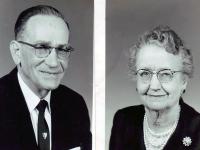
My two grandfathers had both died before I was born, so I never knew what it would feel like to have a grandfather. But I did have an Uncle Wilburn that I loved. Uncle Wilburn taught me how to hold my playing cards like a fan so I could see everything in my hand at once. He smelled of cigars, and laughed a lot, and had brown leathery skin from being out in the sun too much. He seemed to like me, and I thought he was wonderful. His wife was my grandmother Whitesell’s sister, my Aunt Bess, who made me the Barbie clothes and helped me make a little patchwork quilt for Barbie too.
Grandmommie was named Bonnie Long Whitesell, so my cousin Bonnie Kay was her namesake. She was white-haired when I first knew her, and sort of “stout” as she called it; then later on she didn’t have much hair left and wore a wig, and her frame became bony and frail. Her favorite color was blue, so her bathroom was a dark blue, with the big white clawfoot tub, and almost all her clothes were shades of blue. By the time she moved to a nursing home, her daughter-in-law Lois would go dress shopping for her and bring five or six blue dresses to pick from, and Grandmommie would select a couple and send the rest back. But until I was in my twenties, Grandmommie lived in the big old house on Primrose Lane where she lived for a total of fifty years.
The house was near Christ the King Catholic Church, and in the winter night air you could hear the church bells echo through the neighborhood. I always had a fantasy that we could visit their Midnight Mass at least one Christmas “for a cultural experience” as I would position it, but no one went for the idea. I would look through the upstairs bedroom window out at the trees and listen to the church bells and wish I could share in that Christmas majesty.
Grandmommie loved to greet you at her front door and say, “Come in this house!” with a welcoming energy. She could do lots of things. She could garden, she knew the names of tons of flowers and could arrange them beautifully, she could make the very best fried chicken and sweet iced tea and fudgecake ever, and she could sew. I became very particular about the kind of underwear I could tolerate when I was still quite young. I couldn’t stand nylon. Nobody accused me exactly of being “The Princess and the Pea” but I really was. So Grandmommie actually designed and made me cotton slips.
Speaking of gardening, Momma learned a lot from her mother about flowers, how to grow them, what their names were, and she became a serious gardener in her own right. Because she had a career as a librarian, she never had time to join a garden club, or learn Ikibana (Japanese flower arrangement), like Grandmommie did, but she always gardened. I have often thought in the years since I left home how sad it is that I wasted the opportunity to learn that from her.
Because it was Momma’s thing, and because she made me so unhappy that I didn’t want to be like her, I rejected her as a source of education in many areas. She could have taught me more about knitting, crocheting, sewing, cooking. The world of gardening is only one of many pleasures she could have introduced me to if our relationship had allowed it. I still feel that the realm of growing plants and trees is a mysterious foreign land. I never learned to speak its complex language. I do have a natural knack for arranging flowers, which I guess is inherited.
At Grandmommie’s we would set up a card table in the guest bedroom downstairs, which served as her parlor, and play Scrabble. We also played Chinese checkers. I loved having breakfast with her in her sunny kitchen. She always had Pepperidge Farm whole wheat bread in its bag on the table, and she would slip a couple of pieces into the silver toaster and it would smell so good. Then we would always put butter and honey on it.
She liked to boil her coffee in a saucepan on the stove. (She didn’t own a percolator, and the days of Mr. Coffee hadn’t arrived yet.) She might cut an orange in half, or a banana, and share it with me. There was a green plant in the center of the Formica breakfast table that dripped its tendrils down and covered the flowerpot…the name was some kind of “tears”.
In the big brown pantry off the kitchen, there were shelves full of wonders, and I was most surprised to see a collection of tiny bottles. I loved tiny things, and I was surprised to find out that she did too. And I loved going down in her “root celler” – a basement that really was just dirt, with wooden shelves built in for canned goods.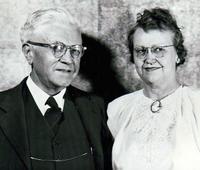
Here's a picture of Grandmommie and my grandfather, Virgil Marion Whitesell. He was called "Uncle". He was a traveling salesman who returned home on the weekends and enjoyed having lots of people around. That was a good thing, since two couples lived with them, along with the three children, during the depression - her brother John and his wife Mary, and Aunt Bess and Uncle Wilburn.
My favorite thing about spending the night with Grandmommie when I was little was that she would tell me stories. I had a favorite I asked for every time – the one she called Epondanondas. Years later, I found the original version of the story in Elder’s Used Bookstore, and the real title was Epaminondas. Grandmommie told it so well, and drew out all the descriptions even more than the storybook did. But the last time I asked her to tell it to me, she had forgotten it.
Grandmommie’s house was in walking distance of Belmont Boulevard, and if you continued down that street a ways, turning left on Woodmont and right again on Granny White, you would come to Maplehurst. It was a street that ran alongside the Lipscomb track, and when she was younger and healthier, Nannie could walk to the Granny White Church of Christ, which was the college congregation. Later on, Winston and Martha Nell drove by and picked her up for church.
Nannie’s house was on a little slope, and in the front yard I loved her cast iron lawn furniture painted white and looking like a tea party. Inside, her home was full of treasures I did not appreciate. She had china figurines of men and women in French Rococo clothes, and lamps of dark red glass, and other decorative items that were not attractive to me. There were a formal living room and dining room, with dark wood and silk and brocade. But that was okay, I didn’t spend time in her living room unless it was to listen to her play the piano.
She loved a ballad, “Dear Heart”, that was popular when I was a child, because it reminded her so much of Pappy Moore, her husband who died before I was born. And she loved to play “Somewhere My Love” from Dr. Zhivago. She could also play inaccurate but lively ragtime, including Scott Joplin. It totally amazed me when Paul Newman and Robert Redford made The Sting and Joplin’s music was revived for the movie. Then I thought Nannie was cool. “Honey, why, ‘The Entertainer’, why don’t you know I heard Liberaci play that on TV the other night, and it nearly thrilled me to death,” she told me once.
My favorite thing about Nannie’s house was the feeling of acceptance. She “spoiled” us grandkids. She never talked about diet or weight, she never criticized me, and she never put limits on what we could do. She was so indulgent, she took Suzanne and Bonnie and Ronnie’s dog, Shane, for several years. Marian had decided she didn’t want the dog anymore, but Nannie couldn’t stand for the kids to lose Shane.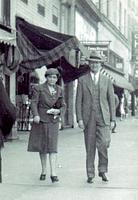
She would make tomato sandwiches on white bread with mayonnaise – such a luxury – and bring them with Cokes on trays into the TV room in the back of the house. We would sit next to the air conditioner and get completely chilled watching TV. She had an air conditioner also in her living room. In the bedroom at night, we would open the window and she had a fan on a stand that would oscillate. Waiting for that precious breeze to blow on me every time the fan turned toward me would lull me to sleep, while Nannie scratched my back and told me tales about the olden days. Here's Nannie and "Pappy" Moore walking down the street in Smithville, Tennessee, where he was mayor for awhile. I wish I could have met him.
Her favorite tale was about the bootleggers. It seemed that she was with her dad and some others in a car traveling from Nashville to Knoxville when there really weren’t any good roads, and they were in the Smoky Mountains and it was night. They had been warned of the dangerous bootleggers than lived in those hills, and lo and behold, they got stuck in the mud. Oh, the fear they suffered as they waited on the flat to be fixed. As I recall, I had no idea what bootleggers were, the word just sounded dark and nasty. And as I recall, the fearful night in the mountains passed uneventfully. The real tension was in their imaginations, as they anticipated potential horrors lurking all around them. Her story sure did a good job of scaring me when I heard it.
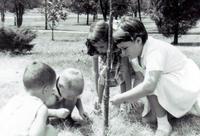
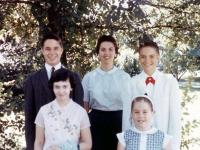

No comments:
Post a Comment